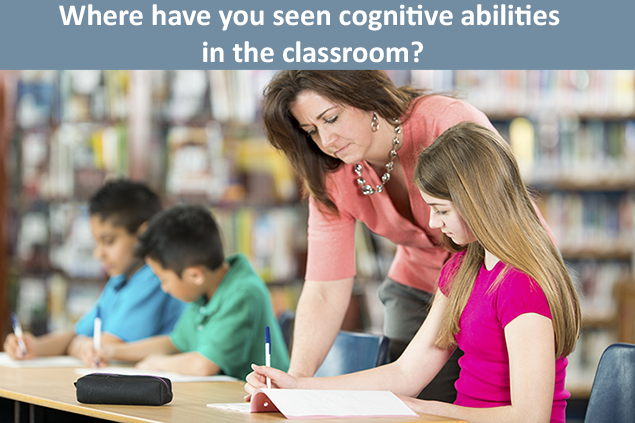How can Teachers Identify a Child’s Cognitive Ability/Potential for Better Learning Outcomes?
Posted by Network Support · Leave a Comment
The key to solving a persistent learning challenge is to strengthen the person’s basic processing or cognitive skill set…
Cognitive skills are the mental capabilities we need to successfully learn academic subjects. Underlying Without these skills we would not be able to process the information we receive cognitive skills must function well for us to efficiently and easily read, think, prioritize, understand, plan, remember, and solve problems. From sources around us through our senses of sound, touch, sight, taste, and smell. So essentially, cognitive skills are the individual mental skills we use to learn. Thus, when Cognitive Skills are WEAK, academic learning is at best, a struggle. When Cognitive Skills are STRONG, academic learning is fast, easy, efficient and fun!
Why it Matters
When we understand where cognitive skills fit into everyone’s learning process, we can see how truly important they are — which leads to another critically important truth: cognitive skills can change. Cognitive skills, learning skills, underlying skills, learning tools (no matter what we call them) can be improved, strengthened, and enhanced, regardless of a person’s age.
Cognitive skills determine how easy, fast and well a person learns. In other words, cognitive skills are the learning skills used to:
- Attend to and retain the information.
- Process, analyze, and store facts and feelings.
- Create mental pictures, read words, and understand concepts.
Assessing Skills
Similar to a medical doctor’s use of ultrasound or an MRI, it’s possible to snap a picture of our underlying cognitive skills. Proper testing allows us to figure out the cause and effect relationships between a student’s learning skills and the academic and work activities they directly impact.
1. Weak Skills
Successful learning requires coordination and cooperation between automatic processing and higher thinking cognitive skills. Here’s ways that weakness in any of these mental skills might affect a student’s performance. If any one of these cognitive skills is weak, it will hinder a student’s performance.
- If attention is weak the student may never fully hear a request.
- If short-term memory is weak the student may forget the request before you respond, maybe needing the request repeated.
- If processing speed is slow the request may seem too complex, requiring the student to need to have it repeated.
- If logic and reasoning is weak the student may fail to come up with a solution.
- If auditory processing is weak the student may be unable to unglue sounds as in “Washington.”
- If long-term memory is weak the student may be unable to remember letters that represent sounds as in “Washington.”
- If visual processing is weak the student may be unable to create a picture of a word in their head.
2. Strong Skills
To a large extent, the quality of a child’s learning tool determines how they will do at school. Have you ever attempted a building project without the right tools? How frustrating and ultimately expensive that can be! It’s far easier and more efficient to build a house with top-quality power tools than with a hand saw, hammer and screwdriver. The process of learning is similar. Effective learning is dependent on the efficiency of underlying learning tools.
Think of the mental skills we all have as similar to tools. If one has limited tools like a hammer, a wrench and a screwdriver, certainly they can build a house.
- They might have to use a screwdriver to chop the wood.
- It isn’t going to look very good.
- It’s going to take a long time.
- Demand a lot of energy.
So, while they probably can do it, imagine the advantages they’d have with tools that are a whole lot better. This is the difference that strong cognitive skills make.
Like this article for teachers?
Browse the Professional Learning Board COURSE CATALOG to find related online courses for teachers in your state. Professional Learning Board is a leading provider of online professional development classes that teachers use to renew a teaching license or renew a teaching certificate.





